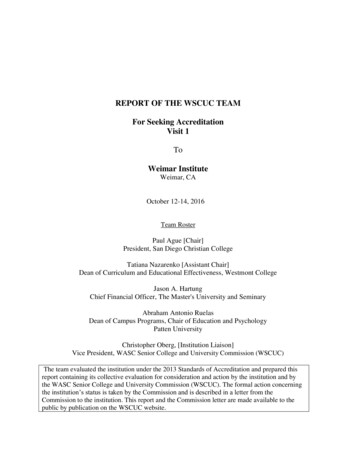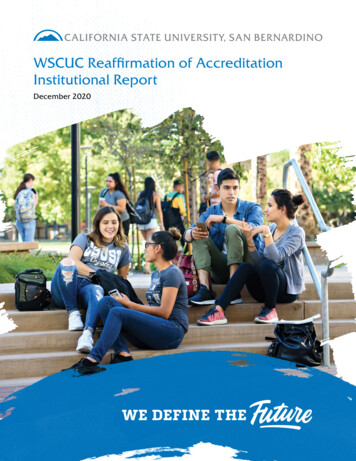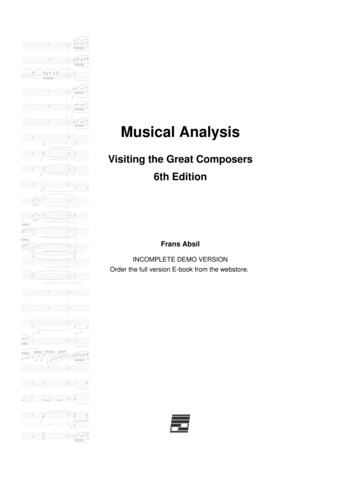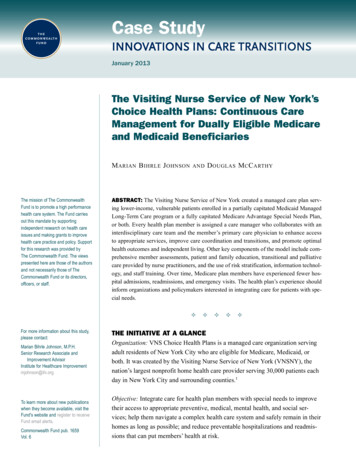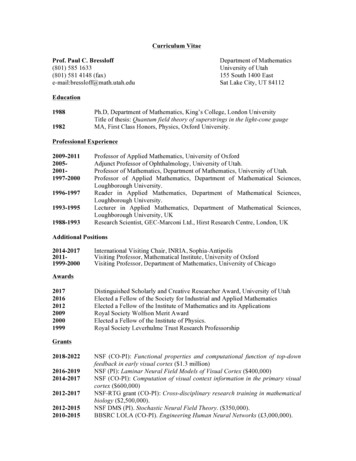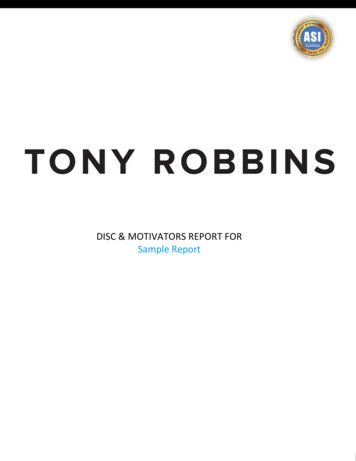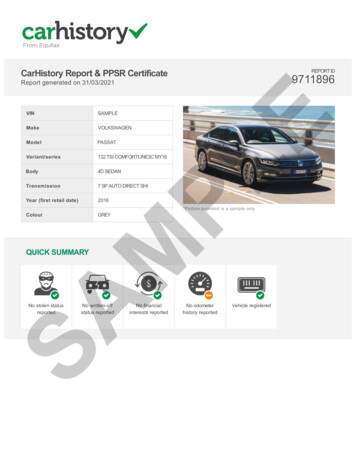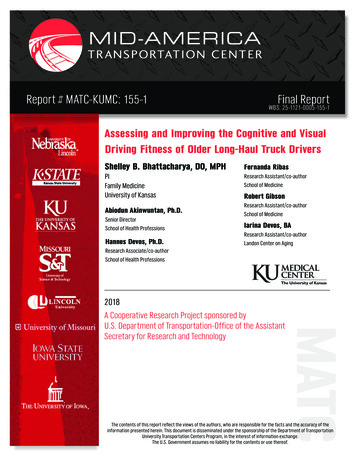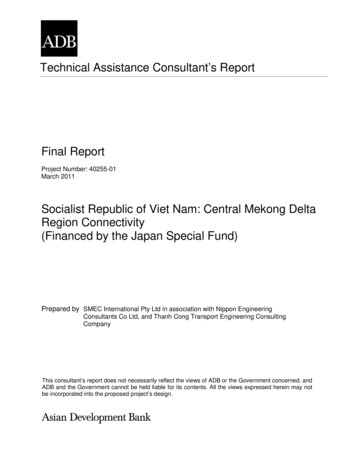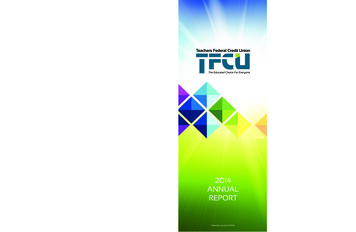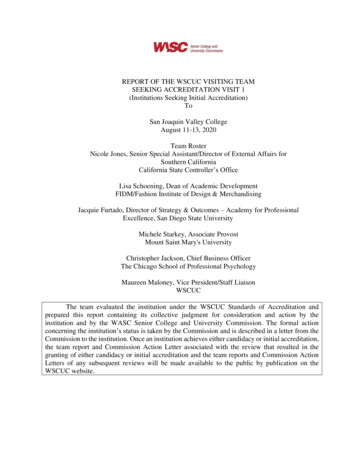
Transcription
REPORT OF THE WSCUC VISITING TEAMSEEKING ACCREDITATION VISIT 1(Institutions Seeking Initial Accreditation)ToSan Joaquin Valley CollegeAugust 11-13, 2020Team RosterNicole Jones, Senior Special Assistant/Director of External Affairs forSouthern CaliforniaCalifornia State Controller’s OfficeLisa Schoening, Dean of Academic DevelopmentFIDM/Fashion Institute of Design & MerchandisingJacquie Furtado, Director of Strategy & Outcomes – Academy for ProfessionalExcellence, San Diego State UniversityMichele Starkey, Associate ProvostMount Saint Mary's UniversityChristopher Jackson, Chief Business OfficerThe Chicago School of Professional PsychologyMaureen Maloney, Vice President/Staff LiaisonWSCUCThe team evaluated the institution under the WSCUC Standards of Accreditation andprepared this report containing its collective judgment for consideration and action by theinstitution and by the WASC Senior College and University Commission. The formal actionconcerning the institution’s status is taken by the Commission and is described in a letter from theCommission to the institution. Once an institution achieves either candidacy or initial accreditation,the team report and Commission Action Letter associated with the review that resulted in thegranting of either candidacy or initial accreditation and the team reports and Commission ActionLetters of any subsequent reviews will be made available to the public by publication on theWSCUC website.
Table of ContentsSECTION I.OVERVIEW AND CONTEXT . 2SECTION II. EVALUATION OF INSTITUTIONAL COMPLIANCE WITHWSCUC’S STANDARDS . 8Standard 1 . 8Standard 2 . 11Standard 3 . 20Standard 4. 26SECTION III. PREPARATION FOR ACCREDITATION UNDER THE 2013HANDBOOK OF ACCREDITATION . 31SECTION IV. IEEI . 32SECTION V. FINDINGS, COMMENDATIONS AND RECOMMENDATIONS 33APPENDICES . 35Federal Compliance FormsReport on Off-Campus and Distance Education Programs1
SECTION I – OVERVIEW AND CONTEXTA. Description of Institution and Visit Provide background information on the mission and nature of the institution, includingbrief history, location(s), size, levels and kinds of degrees awarded.San Joaquin Valley College is a private, proprietary college with seventeen branchcampuses throughout California and an online-education division. From its founding in 1977 as asource for training in medical assisting, it has expanded to its current seventeen campuses andonline division, and offers certificates and associate of science degrees in allied health fields,business office administration, construction management, and the skilled trades. SJVC currentlyoffers a post-licensure bachelor’s in Respiratory Therapy and has approvals in place for threemore.SJVC holds programmatic accreditation for eleven of its programs and providedinformation to that effect in its report. ACCJC accreditation was initially granted in 1995 andwas most recently re-affirmed in 2019. The college is owned and run by San Joaquin ValleyCollege, Inc. (SJVCi) and is overseen by a Board of Governors (please see the discussion ofStandard 3 for more information about the management and delegation of decision-makingauthority at SJVC). SJVCi also owns Carrington College, and has established Ember Educationto provide operational services through an informal service level agreement to both institutions. Indicate whether the institution has off-campus sites or distance education programsand, if so, which ones were reviewed as part of this visit. A report on any such mattersmust be included as an appendix and discussed, as appropriate, within the body of thereport.The campuses and online division enroll approximately 4500 students. The VisitingTeam conducted remote interviews at four campuses (Hesperia, Ontario, Temecula, and Visalia)2
and met virtually with staff and faculty from the online division. Reports are included in theappendix. Indicate any new degrees added since the institution was granted Eligibility. Health Care Management (BS)Dental Hygiene (BS)Registered Nursing (BS)B. The Institution’s Seeking Accreditation Visit 1 Report: Alignment with the Letter of Intentand Quality and Rigor of the Review and Report1. Describe briefly the intended outcomes for the Seeking Accreditation Visit 1 as set forthin the institution’s Letter of Intent, and the approach that the institution adopted for thereview. The way in which the institution implements the Letter of Intent is an indicatorof its commitment to engage in serious self-review and improvement.The Visiting Team found that SJVC addressed the Eligibility Review Committee’sconcerns in the Letter of Intent and followed up on the progress of those initiatives in a thoroughand well-documented fashion in the Seeking Accreditation Visit 1 (SAV1) report. Briefly, theconcerns touched on areas of institutional governance, faculty governance and scholarship, andthe integration of formal program review processes into overall institutional improvement. Theteam was able to pursue these areas at length during the visit, and found that the institution hasincorporated the Committee’s recommendations into its overall commitment to continuous, datadriven decision-making. See below, sub-heading C, for more specific information about theEligibility Committee’s recommendations and SJVC’s response.3
2. Describe the overall quality of the Seeking Accreditation Visit 1 Report and its value inthe review process.The team found the SAV1 report to be clear, well-organized, and supported by evidence.The institution documented the involvement of staff, faculty, and senior leadership in thepreparation of the report as well as in the integration of Eligibility Review Committee (ERC)recommendations into SJVC institutional processes.The report shows an institution for which data-driven improvement and collaboration arecore values. SJVC committed itself to a rigorous process of self-review as part of its applicationfor WSCUC accreditation, and has, as a result, developed and implemented a number ofinitiatives designed to make fundamental improvements to the operation of the institution. Theteam was able to see the result of this current cycle of review and revision at every level, and toverify that processes documented in the report had been incorporated into the institution’spractices. The team also found that the data-driven approach college operations detailed in theSAV1 report is, in fact, a key aspect of the institutional culture.Throughout all levels of the college, staff and faculty refer consistently to their access todata as an integral part of their effectiveness in their roles, and the team saw numerous examplesof large and small changes made in response to problems identified by the data.C. Response to Issues Raised in the Eligibility Review Committee Letter Set forth each major recommendation of the Eligibility Review Committee letter, andprovide a brief description and analysis of evidence showing how the institution hasresponded. If an issue remains a concern and is discussed in Section II or III of the teamreport, this section may refer to content in those sections.4
EC 5 Improve monitoring of programs to avoid further sanctions from programmaticaccreditors (CFR 4.1)In the Letter of Intent, SJVC described the development and planned implementation of anew, multi-part system for overseeing those programs holding programmatic approval or stateapproval. The Programmatic Accreditation and State Regulatory Compliance Health Check andMonitoring System (Health Check) includes enhancing leadership capacity at the program leveland facilitating better communication between SJVC’s Central Administrative Office, programleadership, and external regulatory bodies. In the SAV1 report, the institution discussed theinitiation of systematic training for program directors and provided attendance records fortrainings held in 2018-19.Another part of the Health Check was the development of a Programmatic andRegulatory Tracking Tool. This tool was implemented alongside a comprehensive audit processincorporating audit training; the SAV1 report provided an audit calendar and documented thetwenty-one program audits held in 2019. At the time of the visit, the team was invited to view theHealth Check System and discuss its use with program leadership; all programmaticaccreditations and state approvals were documented to be in place. EC 7 Make further changes in governance practices in order to come into fullcompliance with the WSCUC Governing Board Policy CFR 3.9In response to this directive, SJVCi and the college’s Board of Governors embarked on acomprehensive review of the Board’s governing policies, which culminated with the submissionfor WSCUC review of a significantly-revised set of Board bylaws. The Letter of Intent detailedthis process, which involved an external consultant and the assistance of WSCUC Vice PresidentChristopher Oberg. The SAV1 report provides evidence of the adoption of the new bylaws by theBoard. Further detail on the governance of SJVC is provided in the discussed of Standard 3,below.5
EC 10 Implement changes in curriculum, learning outcomes, faculty, andadministration in order to prepare for offering bachelor’s degrees (CFR 2.2a)In its Letter of Intent, SJVC outlined its plans to add three additional bachelor’s degrees(in Dental Hygiene, Health Care Management, and Nursing) to its current post-licensure BS inRespiratory Therapy. As part of these plans, the college identified the resources the institutionwould be developing in order to successfully launch, support, and sustain these programs. In theSAV1 report, the institution discussed its enhancements to curricular and program reviewprocesses, including the development of a new, comprehensive Program Review Dashboard andits plans to expand the disaggregation of student performance data. In addition, the inaugurationof a faculty-run Academic Council (discussed below), has allowed the faculty to take a moreactive leadership role in the development of curricular and pedagogical resources and theassessment of faculty qualifications and ongoing mentorship of new faculty.During the visit, the team was able to view these resources and engage in discussion withmembers of the Academic Council as well as faculty mentors, subject-matter and curricularexperts, and program leaders from across the institution. The team also had the opportunity todiscuss the institution’s implementation of the Scholarly and Creative Work Program as well asinstitutional support for faculty development over a wide range of areas including continuingprofessional education and development of competencies relating to teaching, learning, andworking effectively with SJVC’s particular student population. Please see the discussion ofStandard 2 for more information on the purposeful integration of faculty leadership and the useof program-review resources into the institution’s baccalaureate-level degree planning. EC 13 Review faculty governance practices in advance of SAV1 (CFRs 2.4, 3.10)In preparation for its Letter of Intent, SJVC undertook an exploration of facultygovernance models at other institutions, and then worked with baccalaureate-level faculty andthe director of eLearning Curriculum & Instruction to develop recommendations for the6
integration of a faculty governance body into SJVC’s existing academic leadership processes. In2019, a policies and procedures document establishing a faculty-run Academic Council wasapproved by the Board of Governors and college senior leadership, and meetings began in thefall of 2019. These policies, including the policy governing the Council’s nominating procedure,were provided as part of the SAV1 report.During the visit, the team had the opportunity to meet with the chair of the AcademicCouncil, and was able to gain some insight into their working processes and scope ofresponsibility.7
SECTION II. EVALUATION OF INSTITUTIONAL COMPLIANCE WITHWSCUC’S STANDARDSStandard 1: Defining Institutional Purposes and Ensuring Educational ObjectivesStandard 1 looks at the way in which an institution approaches the education and theintegration of its educational mission into its internal processes. The team found the institutionmeets Standard 1 at a level sufficient for Initial Accreditation.Institutional Purposes (CFR 1.1-1.2)The Visiting Team found that fulfilling the institutional mission is a core cultural value atof San Joaquin Valley College (SJVC). The college’s baccalaureate, associate, and certificatelevel programs and its campuses (including its distance learning division) focus on providingcareer education aligned to area employer needs in its Central Valley locations. During the visit,the team was able to see that awareness of and commitment to the college mission is pervasivethroughout the organization. That commitment extends to a singular focus on quality assuranceand compliance with the guidelines established by the college’s programmatic accreditors,certification and licensing boards, and state and federal regulations.Achievement is assessed at numerous points throughout the student’s lifecycle, andincludes measure of attendance, course- and program-level academic progress, and programcompletion. Results are shared across campuses and programs, and used to evaluate the overallhealth of programs on an ongoing basis. The college devotes significant financial andtechnological resources to program review, and supports continuous improvement through datadashboards, compliance audits, and ongoing, paid professional development for faculty andprogram staff.SJVC’s student achievement data is made public on its website and includes thedisclosure of rates at which students succeed in gaining professional certification/licensure. For8
programs where certification/licensure are required for employment, SJVC sets program- andcampus-specific targets, and incorporates target achievement success within annual and periodicprogram reviews.Integrity and Transparency (CFR 1.3-1.8)The visiting team reviewed a wide variety of college policies and spoke to staff, faculty,program and curriculum management, and the leadership teams at SJVC, SJVCi, and EmberEducation, the college’s service provider. While SJVC had made a number of changes inresponse to the WSCUC Eligibility Review Committee’s recommendations, it is clear that SJVCis a process-driven organization, and that the policy changes put into place slotted easily into theorganization’s overall structure and culture.In particular, the college’s policy on Academic Freedom across the campus-based anddistance education was reviewed and the lack of a due process policy was noted. In the SAV1report, the institution provided evidence of the approval of this policy by the Board ofGovernors. In its review of the nascent Academic Council, the team found that responsibility forpedagogy, curriculum, and ongoing professional development and support was shared betweenthe Academic Council and program management, and includes extensive input from externalaccrediting/licensing boards and the professions for which SJVC students are studying.The team also reviewed the work of the new Diversity, Equity, and Inclusion committee,and found that, at the campus level, faculty and staff are drawn from the populations SJVCserves. Diversity training is included in onboarding for new faculty, and touches on the issuesfirst-generation students and students from lower socioeconomic groups can face in attendingcollege. Additional work in this area is underway for both the on-campus and distance educationprograms. SJVC is extending its capacity to disaggregate its student progress and achievementdata, and has targeted its African-American students for additional resource provision; SJVC9
shared the improvements seen recently, while noting that its Hispanic students continued toperform at higher levels overall. The institution is encouraged to continue the process ofleveraging its data collection and provision for the benefit of all students at SJVC.Relatedly, the team feels confident in stating that SJVC is an education-drivenorganization. Students and student achievement are its singular focus. The institution deployssignificant resources toward ongoing monitoring of student progress and achievement and theoverall effectiveness of the curriculum in guiding students not just toward graduation but intoprofessional employment.Information about student outcomes is broadly shared with prospective students and thevarious entities charged with overseeing professional standards for qualification and licensing.Many of these disclosures are mandated by state and federal regulations and by guidelines withinthe professions SJVC serves, and the institution maintains staff at the senior leadership andprogrammatic levels who work as a team to ensure that program staff and the public have accessto the information they need to evaluate the performance of the SJVC.SJVC’s SAV1 report and the infrastructure behind the development of that document andits supporting evidence speak to an organization with significant capacity to capture and deployinformation about its own effectiveness, and the institutional willingness to engage in ongoinggoal-setting and improvement. Issues noted by the Eligibility Committee were addressed, andimprovements put into place and on the schedule for review and evaluation. In the short term,SJVC has streamlined its programmatic oversight, bringing the college into compliance with allof its programmatic accreditors. As SJVC moves into its relationship with WSCUC, it may findthat adopting more comprehensive and longer-term metrics for retention and completion, toname one example, will enhance its capacity engage in robust assessment practice at thebaccalaureate level and beyond.10
Standard 2: Achieving Educational Objectives Through Core FunctionsStandard 2 looks at the institution’s capacity to meet its educational mission. The teamfound the institution meets Standard 2 at a level sufficient for Initial Accreditation.Teaching and Learning (CFR 2.1-2.7)Around the area of teaching and learning, the visiting team reviewed the College Catalog,the faculty qualifications document, data reports, ILOs, assessment plans, and program reviews,as well as met with senior leadership and faculty/staff to learn about the implementation ofstandard 2.It is clear that SJVC is committed to continuous quality improvement, which isdemonstrated in the amount of data that they regularly collect and analyze. Multiple dashboards,reports, and software are used by all campus constituents to evaluate program effectiveness,student learning and faculty teaching. SJVC has a Program Review process to evaluate thestatus, effectiveness, and progress of their programs and to help identify the future direction,areas for improvement, and priorities of those programs. SJVC also utilizes data collected attheir various campuses to identify units which can be models of best practices, as well as whichunits need to be improved.The academic programs reviewed were of an appropriate content and standard. Eachprogram is aligned to a corresponding Classification of Instructional Program (CIP) code withthe Un
Aug 17, 2020 · San Joaquin Valley College is a private, proprietary college with seventeen branch campuses throughout California and an online-education division. From its founding in 1977 as a source for training in medical assisti
